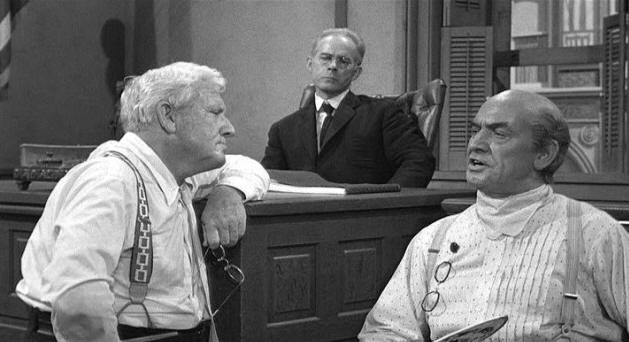
Made in 1960, Inherit the Wind is a closely rendered version of the "Scopes Monkey Trial" of 1925, with most of the courtroom arguments being taken straight from the trial transcripts.
(I’ve been surprised by how many people have never seen this movie, and that some don’t know the trial very well. For a summary, check out this entry in wikipedia.) The rhetoric text I’m using this semester, The Elements of Persuasion, has a whole chapter devoted to the actual trial, so showing the movie fit in especially nicely this semeter.
The movie works very well in a 306 class as a way to discuss arguments on several levels. First, there's the basic argument of the trial, which was not just about the Tennessee law forbidding the teaching of evolution, but about the reconciliation of scientific and religious views of the world. At the same time, there is the subject of admissible information: the court rules that scientists who would argue the validity of the theory of evolution are not allowed to testify, based on the judge’s ruling that its validity has no bearing on whether or not Scopes (“Cates” in the movie) violated the law.
And then, of course, there is the argument being made by Stanley Kramer, the director of the movie. While many of us might see the legal case alone, the defense and the prosecution arguing the Truth of the Bible versus the Truth of Intelligence (which are indeed major arguments), and while many of us might feel justified in seeing creationism and its proponents as ridiculous, the director is after something else. In this movie there are five central characters: the Teacher, his Fiancée, a Baptist Minister (the Fiancée’s father), and the Defense and Prosecuting attorneys. The Teacher and the Minister stand for intellectualism and religion, or maybe “thinking” and “faith”. The attorneys are those who would defend each. The Fiancée, caught between her father and her husband-to-be, loves Thinking and wants to love and be loved by Faith. Herein lies the real struggle. She loves both, but is told that she can’t love Thinking and be loved by Faith, nor can she stay connected to her Faith and love Thinking.
With the movie’s tight camera work during the trial scenes, the tension between these two all-or-nothing perspectives on the world builds dramatically to two points in particular: one in which Brady, the Fundamentalist Prosecutor, reduces the Fiancée to sobs when he shouts at her to condemn her lover; the other in which the Defense brings Brady to his own demise, left stammering on the stand as his disappointed supporters leave the courtroom. At first glance, it’s a victory of Thinking over Faith. And yet, the sight of the Prosecutor, a good man and a gifted and beloved orator, trying to find his footing by nonsensically reciting the books of the Bible, is heartbreaking.
What has surprised me most about showing this black-and-white movie in class is the students’ engagement with it. The first thing I notice is that they laugh—at the melodramatic scenes as well as at the parts meant to be funny to the 1960 audience. And in a scene near the end, they react with intense shock (imagine a classroom-sized sharp in-breath) to a slap in the face. They seem to connect, unsurprisingly, to the cynical reporter (based on H.L Mencken). I see no nodding heads, I don’t have to wake anyone up. Why? In one class discussion a couple semesters ago, one student couldn’t believe the trial happened nearly 100 years ago because at her Christian high school, this debate was still very much alive. Another student remarked that the movie was especially interesting to him as a biology major.
The movie, especially this semester, is not old. As all of us watch the current political news, we hear discussions about small-town conservative America versus progressive urban America, about intellect versus common sense, and about faith versus logic. People bemoan the divisions in our country, and yet hold fast to the idea that they are right to value their perspective over another. The other side is so ridiculous as to be angering, and their views do not deserve to be reconciled with ours. Still we say, you can’t love faith and logic, small-town America and progressive policies, book learning and common sense.
(I expect many of you know the website American Rhetoric. If not, you should check it out. This site gave me the idea to show Inherit the Wind in my 306 class in the first place. Click this link and you can watch one of the crucial scenes of the trial, and/or read the transcript from the movie.)
americanrhetoric.com
Recent comments
2 years 29 weeks ago
2 years 44 weeks ago
2 years 44 weeks ago
2 years 50 weeks ago
3 years 4 weeks ago
3 years 4 weeks ago
3 years 4 weeks ago
3 years 6 weeks ago
3 years 6 weeks ago
3 years 6 weeks ago